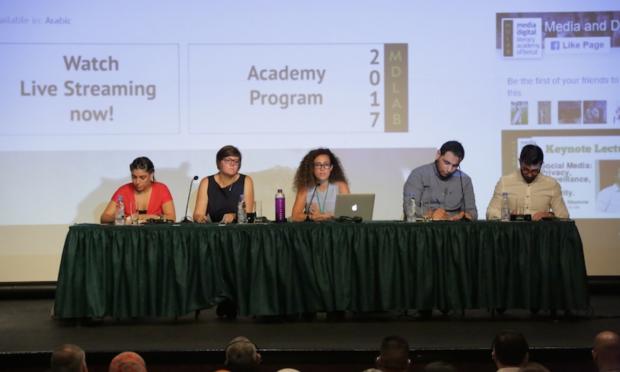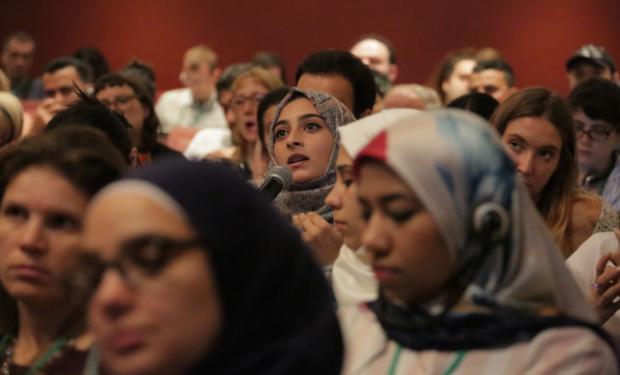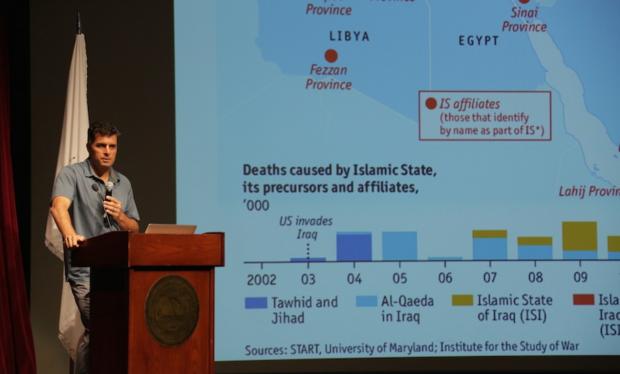LAU Media and Literacy Academy Gains Major Support from Norwegian Embassy
The university’s annual Media and Digital Literacy Academy in Beirut (MDLAB) gained major support this year from the Embassy of Norway to Lebanon. This first-time donor to the Lebanese American University (LAU) enabled MDLAB to run for its fifth consecutive year and funded a majority of the program’s expenses. Most importantly, the support allowed 75 regional and international participants to come together for specialized workshops, trainings, and lectures on important topics surrounding media literacy, including the academy’s theme of countering violent extremism and radicalization.
Held in August for two weeks, and organized by LAU’s Institute of Media Research and Training (IMRT), MDLAB touched on issues that the Embassy of Norway to Lebanon supports explains Manal Kortam, international development officer at the Embassy of Norway to Lebanon.
“Norway aims to increase democratic practices in the Arab region, including disseminating of values related to free speech, tolerance, gender equality, and human rights,” said Kortam. “The MDLAB initiative reinforces the image of Beirut as a liberal country in the Arab world, where people can talk freely,” she added.
MDLAB’s far-reaching impact that transcends borders and the brief two-week session is another reason it garnered support.
“This is not just a two-week project in the summer. It is a year-round project. Every one of these participants is part of a bigger network of media literacy professors and activists in the region. We are always communicating with them back and forth,” said Jad Melki, director of the institute and chair of LAU’s communication arts department.
Each participant — coming from 34 institutions and 16 countries this year — goes through very rigorous curriculum, develops products during their time at the academy, and takes them back to their universities to put into their curriculum. “There is a very concrete measurable outcome in the end,” Melki explained.
“The Embassy of Norway see the value and mission of MDLAB, which is generalizing and promoting media literacy — a type of education that didn’t exist in the Arab world. We have been pushing it and now after five years of work, it exists in 35 universities in the Arab world and several schools in Lebanon and in a few countries. They see the value in that because tangible accomplishments are happening,” continued Melki, who says that MDLAB participants from Iraq, Syria, Palestine, and Jordan are making major advances in media literacy in their hometowns after taking part in the academy.
This year’s MDLAB programming did not disappoint its supporters. Curriculum included technical and professional skill development during afternoon workshops in digital safety, editing software, data visualization, dealing with fake news, and cultural identity, among others.
“The technical skills workshops were highly beneficial,” said participant Bassam Jaafar, a student of advertising at the Lebanese International University. “Today’s language is media, and to know and understand a society we must look at its media,” added Jaafar, explaining his motivation for applying to the academy.
He and his fellow participants also engaged in lectures focusing on a different topic of interest and relevance to societal issues and media practice, as did LAU students and the wider public. Among the focus topics that prompted informative and oftentimes animated discussions were social media surveillance, the ISIS media strategy, ethical data management, digital technology and addiction, and the portrayal of women and sexuality in the media.
“We could not have put on such a rich program without the remarkable support from the Norwegian Embassy who have values similar to those of our university, such as the freedom of speech, liberty, and democracy, as well as working for a better tomorrow,” commented Suha Abou Rialy, associate director of development at LAU who played a key role in gaining the embassy’s support.


